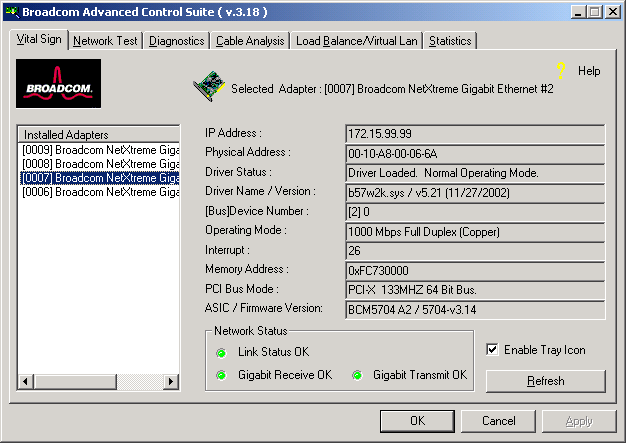

- OPTIMIZE BROADCOM 802.11N NETWORK ADAPTER HOW TO
- OPTIMIZE BROADCOM 802.11N NETWORK ADAPTER INSTALL
- OPTIMIZE BROADCOM 802.11N NETWORK ADAPTER FULL
OPTIMIZE BROADCOM 802.11N NETWORK ADAPTER HOW TO
For details on how to use Wicd, you can read my other article which I used to find SSID of wireless networks in Ubuntu.
OPTIMIZE BROADCOM 802.11N NETWORK ADAPTER INSTALL
You can install Wicd, an alternative network manager from Ubuntu Software Centre or from the terminal. I am not sure what causes this but I have seen people in Ubuntu Forums talking about this problem in especially in Ubuntu. Slow or inconsistent wireless connection, in some cases, are also due to Ubuntu’s very own default network manager. If you have Ubuntu 16.04 for some reason, you can try it out. This is only applicable if you’re using Ubuntu 16.04 or lower (which is highly unlikely at the time of updating this article) - but this was a working solution back then. Solution 5: Ditch default network manager and embrace Wicd (possibly obsolete) Restart your computer and it should do the magic. But, if it does work, you can type in the following commands to make the change permanent: sudo suĮcho ".disable_ipv6 = 1" > /etc/nfĮcho ".disable_ipv6 = 1" > /etc/nfĮcho ".disable_ipv6 = 1" > /etc/nf If it doesn’t work, simply reboot your system and you will have IPv6 enabled.

Sudo sysctl -w .disable_ipv6=1ĭo note that you’re disabling IPv6 temporarily here. To disable IPv6 support in Ubuntu, use the following commands one by one: sudo sysctl -w .disable_ipv6=1 So, you can surely give it a try if nothing else is working for you. Moreover, if it improves the Wi-Fi speed in some cases. Sometimes, you don’t even need IPv6 support. Let’s go back to the previous century and care about IPv4 by ditching IPv6 support. If it doesn’t, check the other solutions. It should fix the slow wireless connection problem for you. Save it, close it, restart your computer. If you find this file, replace it with the following line: hosts: files dns In here, look for the following line: hosts: files mdns4_minimal dns mdns4 You can also use nano instead of gedit if you want to use the terminal. This will open the configuration file in gedit so that you could edit it easily in GUI. Open a terminal and use the following command: sudo gedit /etc/nf

To fix this bug, you have to edit the nsswitch configuration file. Ubuntu and many other Linux distribution are based on Debian so this bug propagates to these Linux distributions as well. The slow WiFi in Ubuntu problem could also be related to a bug in Avahi-daemon of Debian. Solution 3: Fix the bug in Debian Avahi-daemon
OPTIMIZE BROADCOM 802.11N NETWORK ADAPTER FULL
Restart your computer and live your life at full speed. If you find no significant increase in the wireless connection speed, restart the computer to revert the changes and forget about this solution.īut, if it worked for you and you have a faster WiFi now, you should make the changes permanent by using these commands: sudo suĮcho "options iwlwifi 11n_disable=1" > /etc/modprobe.d/nf It’s worth noting that in newer kernels, doing this will also disable the 802.11ac protocol and will limit the device throughput to 54 Mbps as mentioned in Gentoo’s wiki page. Open the terminal and use the following command: sudo rmmod iwlwifi It has been observed that disabling the 802.11 n helps speed up the wireless connection in Ubuntu and other OS. While 802.11n provides better data rate, not all the routers support it, especially the older ones. Even after so many years, most of the world runs 802.11a,b and g. The next trick is to force disable the 802.11n protocol. Solution 2: Disable 802.11n (works best if you have older router) If it does not fix or if you don’t have Atheros WiFi adaptor, try other solutions. Restart your computer and you should be good to go. This will add the additional line to the configuration file. Here, you’re basically enabling a module to use software-based encryption over hardware encryption for your adapter. Open a terminal (Ctrl+Alt+T in Ubuntu) and use the following commands one by one: sudo suĮcho "options ath9k nohwcrypt=1" > /etc/modprobe.d/nf If your adapter manufacturer is Atheros, this solution should work for you.


 0 kommentar(er)
0 kommentar(er)
